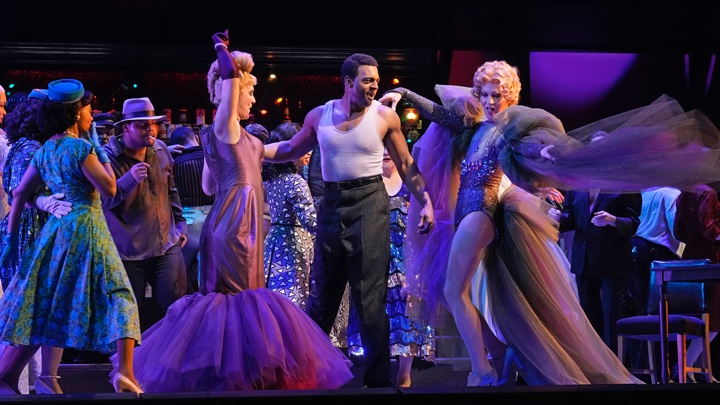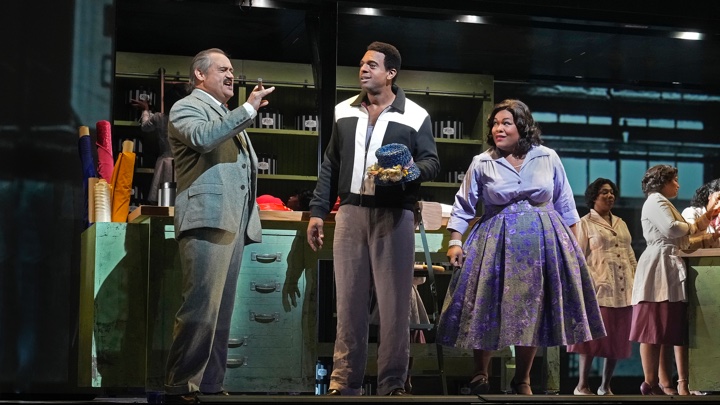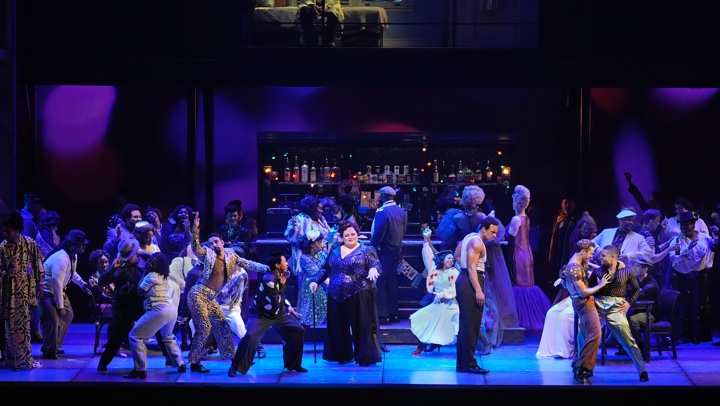

Part of that is the subject, the biography of the bisexual boxer Emile Griffith is fully operatic in scope, with death, violence, and longing aplenty. But Griffith’s story also offers the opportunity to explore some more contemporary issues: Race, homophobia, and toxic masculinity all intersect in a story that feels both ancient and fully of the time. Michael Cristofer adeptly weaves all of these strands into an effective, well-paced libretto, with repeating phrases that acquire greater depth of meaning each time they recur.
The other contribution is Blanchard’s score. It draws from jazz, film, classical, cabaret, and musical theatre. Since Champion’s premiere in St. Louis a decade ago, Blanchard has substantially revised the score, expanding the orchestration, adding new arias, and modifying the vocal line to suit the strengths of his new cast. It’s a heavy score, with rich orchestration and a pounding percussion section. Yannick Nézet-Séguin and the always-excellent Met Orchestra and Chorus sound like they’re having the time of their lives, and the energy coming from the pit and stage is palpable.
What I admire most about Blanchard’s score is that he resists the urge to overuse the voice—some of the most effective moments in the score have no singing whatsoever. That’s not to say that the score can’t be further tightened up: the series of act 1 expository arias drags, and the transition between scenes often feels abrupt, making the score feel fragmented at times.
The episodic feel of the music doesn’t matter as much in the theatre, though, thanks to James Robinson’s smooth direction. Allen Moyer’s unit set seamlessly transitions between locales and eras thanks to clever use of projections and lighting, and Camille A. Brown’s choreography enhances the physical energy of the piece.
Champion takes the form of an extended flashback, anchored by Eric Owens as Emile Griffith’s older self. Despite the fact that his bass no longer as steady or resonant as it once was, Owens is intensely moving in his portrayal of Griffith’s dementia. His performance culminates in a wrenching final aria, lying prone on the stage floor wracked with guilt, shame, and anger. It’s a performance that will stay with me for a long time.
Ethan Joseph nearly steals the show as Little Emile, whose touching solo, a flashback within a flashback, drew the most enthusiastic applause of the evening. Joseph’s plangent tone, scrupulous musicianship, and vibrant stage presence are astonishing for a twelve-year-old, certainly a future star.
The majority of Emile’s story falls to Ryan Speedo Green, whose gorgeous bass-baritone easily transitions between full-throated operatic singing and jazz-inflected parlando passages. His big aria “What makes a man a man” features some lovely vocal writing, but more importantly he imbues the character with a dignity and vulnerability that makes the tragedy of his story all the more poignant. Few operatic roles require the physical athleticism of Emile and his boxing opponent Benny Peret. Both Speedo Green and Eric Greene are utterly physically convincing in their extended boxing sequences.
But the real star of this show is Latonia Moore as Emile’s manipulative, money-loving mother Emelda. Moore has a physical and vocal charisma that lights up the stage, and Blanchard has rewritten her part to display her luxuriant soprano. Moore’s voice shines in moments of opulent lyricism, and although she doesn’t enunciate the text with the same clarity of her colleagues, she shows great pathos and humor. Her act two aria, accompanied by a single bass, is musically the most innovative part of the score and a dramatic highlight.
Paul Groves neatly dispatches his dramatic aria in the second act as Emile’s trainer Howie, full of anger and treacherous high notes, and Stephanie Blythe gets to show off her flair for comedy as the owner of the gay bar Hagen’s Hole. Needless to say, Blythe makes the most of each and every innuendo in the text. There are fine contributions as well from Chauncey Packer and Edward Nelson, and Brittany Renee once again shows off a luscious lyric soprano and magnetic presence that promises an exciting career ahead. There’s an abundance of exciting, big voices onstage, and when they unite in the concertato finale, it’s as thrilling as grand opera should be.
Photos: Ken Howard / Met Opera



























Comments